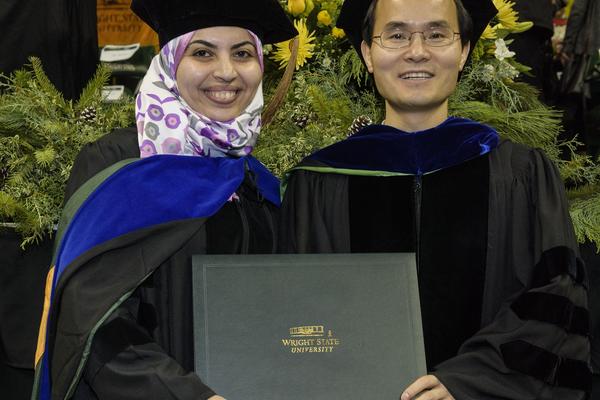
Weiwen Long, Ph.D.
Education History
Ph.D.: 2005 Tulane University (Dr. Frank E. Jones)
Postdoctoral: Baylor College of Medicine (Dr. Bert W. O’Malley)
Research Statement
My research interests and expertise have been directed to the fields of growth factor signaling, steroid receptor/coactivator signaling, and the interplay between these two signaling pathways in cancer progression and metastasis. Our current research interests/projects include:
- ERK3 signaling in cancer progression and metastasis. ERK3 is a member of the atypical MAP kinase subfamily. In contrast to the well-studied classic MAPKs, such as ERK1/2, little is known concerning the molecular regulation of ERK3 signaling and its function in cancers. We recently identified a novel function of ERK3 in promoting lung cancer cell invasiveness by phosphorylating SRC-3 (steroid receptor coactivator 3) and regulating its proinvasive activity. In addition, we have found that ERK3 expression is upregulated in multiple cancers, including lung cancer and breast cancer, and its upregulation is associated with cancer invasiveness. These findings suggest that ERK3 may play important roles in cancer progression and metastasis. We are currently pursuing the following projects to elucidate ERK3 signaling cascade and its functions in cancer:
- To dissect ERK3 signaling pathway utilizing a variety of biochemical approaches including Mass spectrometry-based proteomics: the upstream stimuli and activators and the downstream effectors (substrates).
- To determine the role of ERK3 signaling in cancer progression and metastasis (currently with a focus on lung cancer) utilizing genetically engineered mouse tumor models with tissue-specific ERK3 knock-in or knock-out.
- To determine the interplay of ERK3 and SRC-3 in anti-hormone resistance of breast cancer.
- FBXL16 as an oncogenic F-Box protein in human cancers: We have recently identified FBXL16 as a unique F-Box protein that antagonizes activities of SCF-FBW7 and SCF-βTRCP E3 ligases and thus increases stability and levels of multiple oncoproteins (e.g., c-Myc, SRC-3, β-catenin and KRas) known to be targeted by these SCF E3 ligases. We are currently investigating the role of FBXL16 in the development and progression of non-small cell lung cancers and breast cancer.
Publications
Morel M, Long W. 2023. FBXL16 promotes cell growth and drug resistance in lung adenocarcinomas with KRAS mutation by stabilizing IRS1 and upregulating IRS1/AKT signaling. Mol Oncol. 2023 Nov 20. doi: 10.1002/1878-0261.13554. Online ahead of print.
Amanda K Myers, Marion Morel, Stephen H Gee, Katherine A Hoffmann, Weiwen Long. 2023. ERK3 and DGKζ interact to modulate cell motility in lung cancer cells. Frontiers in Cell and Developmental Biology. Front Cell Dev Biol. 11:1192221.
Vallabhaneni S, Liu J, Morel M, Wang J, DeMayo FJ & Long W. 2022. Conditional ERK3 overexpression cooperates with PTEN deletion to promote lung adenocarcinoma formation in mice. Mol Oncol 16, 1184-1199.
Eid S. Alshammari#, Amjad A. Aljagthmi#, Andrew J. Stacy, Mike Bottomley, H. Nicholas Shamma, Madhavi P. Kadakia*, Weiwen Long*. 2021. ERK3 is transcriptionally upregulated by ΔNp63α and mediates the role of ΔNp63α in suppressing cell migration in Non-Melanoma Skin Cancers. BMC Cancer. 21(1):155
Morel M, Shah KN, Long W. The F-box protein FBXL16 up-regulates the stability of C-MYC oncoprotein by antagonizing the activity of the F-box protein FBW7. J Biol Chem. 2020. 295(23):7970-7980.
Elkhadragy L, Alsaran H, Long W . The C-Terminus Tail Regulates ERK3 Kinase Activity and Its Ability in Promoting Cancer Cell Migration and Invasion. Int J Mol Sci. 2020. 21(11):4044.
Chen M, Myers AK, Markey MP, Long W. The atypical MAPK ERK3 potently suppresses melanoma cell growth and invasiveness. J Cell Physiol. 2018 Dec 19. doi: 10.1002/jcp.27994. [Epub ahead of print]
Elkhadragy L, Alsaran H, Morel M, Long W. Activation loop phosphorylation of ERK3 is important for its kinase activity and ability to promote lung cancer cell invasiveness. J Biol Chem. 2018, 293(42):16193-16205
Tanaka K, Martinez GJ, Yan X, Long W, Ichiyama K, Chi X, Kim BS, Reynolds JM, Chung Y, Tanaka S, Liao L, Nakanishi Y, Yoshimura A, Zheng P, Wang X, Tian Q, Xu J, O'Malley BW, Dong C. 2018. Regulation of Pathogenic T Helper 17 Cell Differentiation by Steroid Receptor Coactivator-3. Cell Rep. 23(8):2318-2329
Zhang C, Xiao X, Chen M, Aldharee H, Chen Y, Long W. 2018. Liver kinase B1 restoration promotes exosome secretion and motility of lung cancer cells. Oncology Reports. 39(1):376-382.
Alsaran H, Elkhadragy L, Shakya A, Long W. 2017. L290P/V mutations increase ERK3's cytoplasmic localization and migration/invasion-promoting capability in cancer cells. Scientific Reports. 7(1):14979
Elkhadragy L, Chen M, Miller K, Yang MH, Long W. 2017. A regulatory BMI1/let-7i/ERK3 pathway controls the motility of head and neck cancer cells. Mol Oncol. 11(2):194-207.
Chen Y, Tang Y, Long W, Zhang C. 2016. Stem Cell-Released Microvesicles and Exosomes as Novel Biomarkers and Treatments of Diseases (Editorial). Stem Cells Int. 2016:2417268. doi: 10.1155/2016/2417268
Bian K, Muppani NR, Elkhadragy L, Wang W, Zhang C, Chen T, Jung S, Seternes OM, Long W. 2016. ERK3 regulates TDP2-mediated DNA damage response and chemoresistance in lung cancer cells. Oncotarget. 7(6):6665-75
Dasgupta S, Putluri N, Long W, Zhang B, Wang J, Kaushik AK, Arnold JM, Bhowmik SK, Stashi E, Brennan CA, Rajapakshe K, Coarfa C, Mitsiades N, Ittmann MM, Chinnaiyan AM, Sreekumar A, O'Malley BW. 2015. Coactivator SRC-2-dependent metabolic reprogramming mediates prostate cancer survival and metastasis. J Clin Invest., 125(3):1174-88.
Liu J, Cho SN, Akkanti B, Jin N, Mao J, Long W, Chen T, Zhang Y, Tang X, Wistub II, Creighton CJ, Kheradmand F, DeMayo FJ. 2015. ErbB2 Pathway Activation upon Smad4 Loss Promotes Lung Tumor Growth and Metastasis. Cell Reports, 10: 1599–1613
Hartig SM, Bader DA, Abadie KV, Motamed M, Hamilton MP, Long W, York B, Mueller M, Wagner M, Trauner M, Chan L, Bajaj M, Moore DD, Mancini MA, McGuire SE. 2015. Ubc9 Impairs Activation of the Brown Fat Energy Metabolism Program in Human White Adipocytes. Mol Endocrinol. 29:1320-33.
Wang W, Bian K, Vallabhaneni S, Zhang B, Wu RC, O'Malley BW, Long W. 2014. ERK3 promotes endothelial cell functions by upregulating SRC-3/SP1-mediated VEGFR2 expression. J Cell Physiol., 229(10):1529-37.
Weiwen Long, Bert W. O’Malley. 2013. Steroid receptor coactivators (SRCs) as integrators of multiple signaling pathways in cancer progression (Book chapter). Nuclear Signaling Pathways and Targeting Transcription in Cancer (edited by Rakesh Kumar). Springer.
Liu, J., Y. Wang, L. Li, L. Zhou, H. Wei, Q. Zhou, J. Liu, W. Wang, L. Ji, P. Shan, Y. Wang, Y. Yang, S. Y. Jung, P. Zhang, C. Wang, W. Long, B. Zhang, and X. Li. 2013. Site-specific acetylation of the proteasome activator REGgamma directs its heptameric structure and functions. J Biol Chem 288:16567-78.
Long, W., Foulds, C.E., Qin, J., Liu, J., Ding, C., Lonard, D.M., Solis, L.M., Wistuba, II, Qin, J., Tsai, S.Y., Tsai M.J., O'Malley B.W. 2012. ERK3 signals through SRC-3 coactivator to promote human lung cancer cell invasion. Journal of Clinical Investigation, 122:1869-1880.
Activation of androgen receptor induces ID1 and promotes hepatocellular carcinoma cell migration and invasion. 2012. Ao J, Meng J, Zhu L, Nie H, Yang C, Li J, Gu J, Lin Q, Long W, Dong X, Li C. Molecular Oncology, 6(5):507-15.
Hartig SM, He B, Long W, Buehrer BM, Mancini MA. 2011. Homeostatic levels of SRC-2 and SRC-3 promote early human adipogenesis. Journal of Cell Biology, 192(1):55-67
Long W, Yi P, Amazit L, LaMarca HL, Ashcroft F, Kumar R, Mancini MA, Tsai SY, Tsai MJ, O'Malley BW. 2010. SRC-3Δ4 mediates the interaction of EGFR with FAK to promote cell migration. Molecular Cell, 37(3):321-32
Long W, O’Malley BW. 2010. Cross-talk among nuclear receptor coactivators and a membrane receptor promotes tumor cell growth and migration. Cell Cycle, 9(12):2269-2270.
Liu J, Yu G, Zhao Y, Zhao D, Wang Y, Wang L, Liu J, Li L, Zeng Y, Dang Y, Wang C, Gao G, Long W, Lonard DM, Qiao S, Tsai MJ, Zhang B, Luo H, Li X. 2010. REGgamma modulates p53 activity by regulating its cellular localization. Journal of Cell Science, 123:4076-4084
Foulds CE, Tsimelzon A, Long W, Le A, Tsai SY, Tsai MJ, O'Malley BW. 2010. Expression profiling reveals unexpected targets and functions of the human steroid receptor RNA activator (SRA) gene. Molecular Endocrinology, 24:1090-105.
Li X, Amazit L, Long W, Lonard DM, Monaco JJ, O'Malley BW. 2007. Ubiquitin- and ATP-Independent Proteolytic Turnover of p21 by the REGγ-Proteasome Pathway. Molecular Cell, 26:831-842
Naresh A, Long W, Vidal GA, Wimley WC, Marrero L, Sartor CI, Tovey S, Cooke TG, Bartlett JM, Jones FE. 2006. The ERBB4/HER4 intracellular domain 4ICD is a BH3-only protein promoting apoptosis of breast cancer cells. Cancer Research, 66(12):6412-20. (Long W, co-first author)
Long W, Wagner KU, Lloyd KC, Binart N, Shillingford JM, Hennighausen L, Jones FE. 2003. Impaired differentiation and lactational failure of ERBB4-deficient mammary glands identify ERBB4 as an obligate mediator of STAT5. Development, 130(21):5257-68
Clark DE, Williams CC, Duplessis TT, Moring KL, Notwick AR, Long W, Lane WS, Beuvink I, Hynes NE, Jones FE. 2005. ERBB4/HER4 potentiates STAT5A transcriptional activity by regulating novel STAT5A serine phosphorylation events. Journal of Biological Chemistry, 280(25):24175-80
Li, L., S. Cleary, Long W., M. A. Mandarano., C. Birchmeier, and F. E. Jones. 2002. The breast proto-oncogene, HRGα regulates epithelial proliferation and lobuloalveolar functional development in the mouse mammary gland. Oncogene, 21:4900-4907
Awards/Recognition
Research Funding
Current
NCI 1R15CA280818-01A1. Project title: FBXL16 as a novel factor in promoting endocrine therapy resistance and metastasis of ER+ breast cancer. Funding period: 01/15/24-12/31/2026
Completed
American Lung Association Discovery Award (Grant # LCD-823839). Project title: Role of FBXL16 in lung adenocarcinomas with activating KRAS mutations.
NCI 1R01 CA193264-01. Project title: ERK3 Kinase Signaling in Lung Cancer. Funding period: 06/01/2015 – 05/31/2021.
W81XWH-11-1-0798, DOD CDMRP Prostate Cancer Idea Development Award. Project title: Role of SRC-3Δ4 in the Progression and Metastasis of Castration-Resistant Prostate Cancer.
Awards/Recognition
Honors/Awards
2022 American Lung Association Discovery award
2018 Faculty Excellence Award by the College of Sciences and Mathematics, Wright State University
2016 Outstanding Junior Faculty Award by Academy of Medicine, Wright State University
2013 DOD/CDMRP Prostate Cancer Research Program Idea Development Award.
2008 The Prize for outstanding performance and excellence in oral scientific presentation, the annual
symposium of Society of Chinese Bioscientists in America, 2008.
2003 Pre-doctoral Traineeship Award by DOD Breast Cancer Research Program (BCRP)
2002 Basic Research Award in Molecular Bioscience, 14th Tulane Health Sciences Research Days

